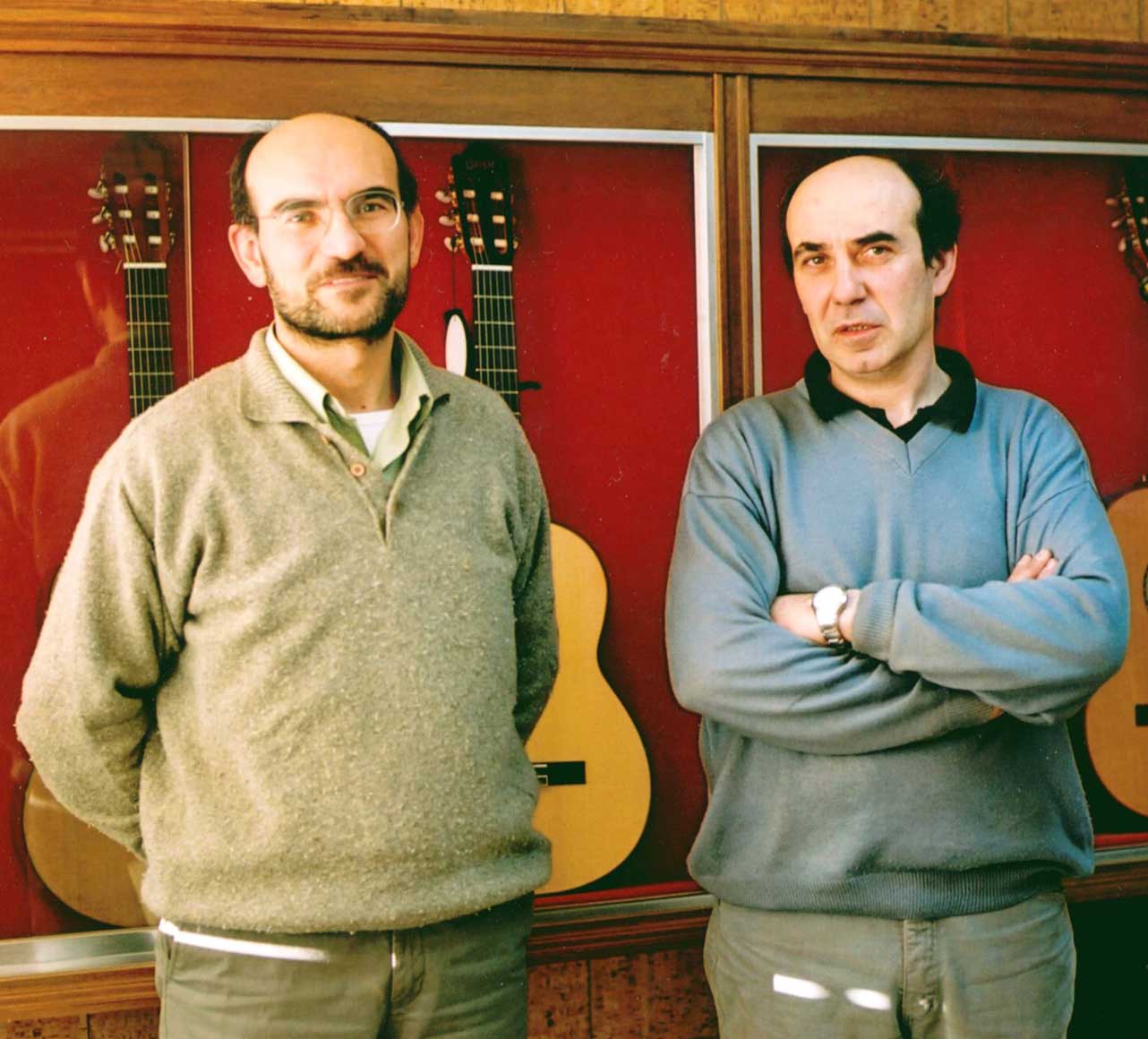Interview with the guitar makers Hermanos Camps, Spain
The brothers Jordi and Javier Camps in an interview with "La Guitarra Flamenca"
Camp's guitars are very popular because they stand for first-class sound, optimal playability and a very good price-performance ratio.But what is the secret of the guitar makers from Girona?
La Guitarra Flamenca:
Does the “CITES *” topic have a major influence on your work and the choice of wood?
Jordi Camps:
Yes, in any case. We currently do not process wood with CITES.
It had a very big influence in the past few years, but the regulations of the CITES committee have already been corrected, ie it has been softened for the construction of instruments and therefore no additional permits are required for our musical instruments.
* Editor's note: Under CITES ("C.onvention onI.nternationalTwheel inE.ndangeredS.pecies of wild fauna and flora ")
one understands the Washington Convention on the Protection of Species, which controls the international trade in endangered animal and plant species.
La Guitarra Flamenca:
In which countries do you sell guitars? In which part of the world are the guitars most popular?
Jordi Camps:
We have sold our guitars in 50 or 60 countries in the last few years and decades, but none of the countries really stands out. We only produce in small quantities.
La Guitarra Flamenca:
How long does the process of building a master guitar take, from choosing wood to finishing?
Jordi Camps:
With the master guitars from our workshop, we speak of a construction time of up to 5 months.
La Guitarra Flamenca:
Which lacquers do you finish the guitars with?
Jordi Camps:
Depending on the model, we use shellac polish or acrylic lacquers.
La Guitarra Flamenca:
You use a special 6-contact system on guitars with pickups that picks up each string individually. How did you come up with this idea?
Jordi Camps:
The bridge insert is made of bone. The sound volume depends on the vibration of the bone in the sound pickup. In order to be able to adjust each string and to achieve homogeneity of the volumes, each of them has its own independent bone.
We use this system on our guitars with built-in pickups. And it has proven itself very well in practice.
La Guitarra Flamenca:
Which method do you use to dry the woods? How long is the wood normally stored before it is processed?
Jordi Camps:
First, controlled drying is carried out in the "Secadero" to avoid cracks, and then natural drying follows so that the wood can age and stabilize. We also have dehumidifiers to help maintain the humidity level.
This depends on the quality of the instrument, with the master guitars we speak of drying periods of up to 20 or 30 years - with the cheaper instruments this time is of course shorter.
La Guitarra Flamenca:
Another highlight that Camps Guitars stands for is the great playability of your guitars and the ergonomics of the neck. What's the secret?
Jordi Camps:
We have invested a lot of effort and time in this topic in recent years. The neck of Camps guitars has ideal ergonomics, which offers great playability. Our customers reflect that too. Aside from having a good grip, the hand plays effortlessly and can easily slide down the neck. The first impression when you have such a guitar in your hands is very pleasant, which is confirmed even more over time. The consequence of installing a bilateral adjustable tension rod is that the neck is thinner and has the best ergonomics.
La Guitarra Flamenca:
What is the difference between the built-in “adjustable tension rod” on the Camps guitar models and the “neck reinforcement” on the Hermanos Camps models?
Jordi Camps:
The guitar models of the "Camps" series have built-in the adjustable tension rod. This allows regulation and control of the fretboard curvature. This could change due to the tension of the strings, the humidity and the temperature.
This subsequent correction is not possible with the carbon neck reinforcement because it is permanently installed.
La Guitarra Flamenca:
In addition to high-quality guitars, Camps also stands for innovation and new technologies. Are there any new trends and ideas that you are currently researching and developing?
Jordi Camps:
Yes, there are always main topics. The subject is very important to us. We are currently investigating the topic of even more ecological paintwork. And we're always working to improve the balance between comfort and sound.
La Guitarra Flamenca:
At the end of the interview, do you have a message or a recommendation for the guitarists out there?
Jordi Camps:
Yes very much. We recommend that you always seek good advice when buying a guitar, with good specialists and preferably in specialist shops. Also try to try out different guitars from different guitar makers to find the best guitar for you in the end.
La Guitarra Flamenca:
Thank you very much for the interview and the time. Stay healthy!















